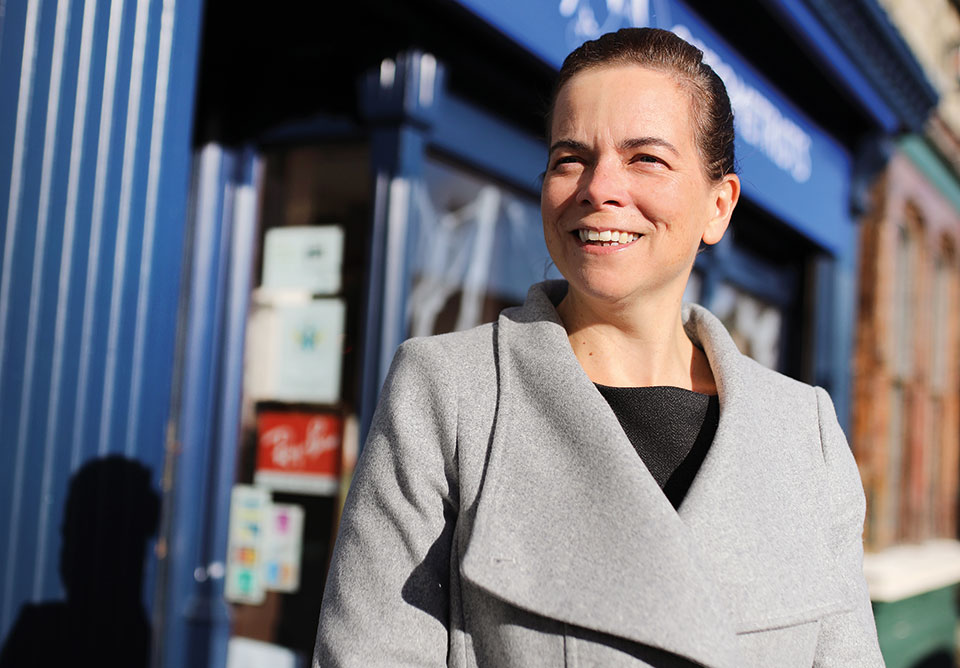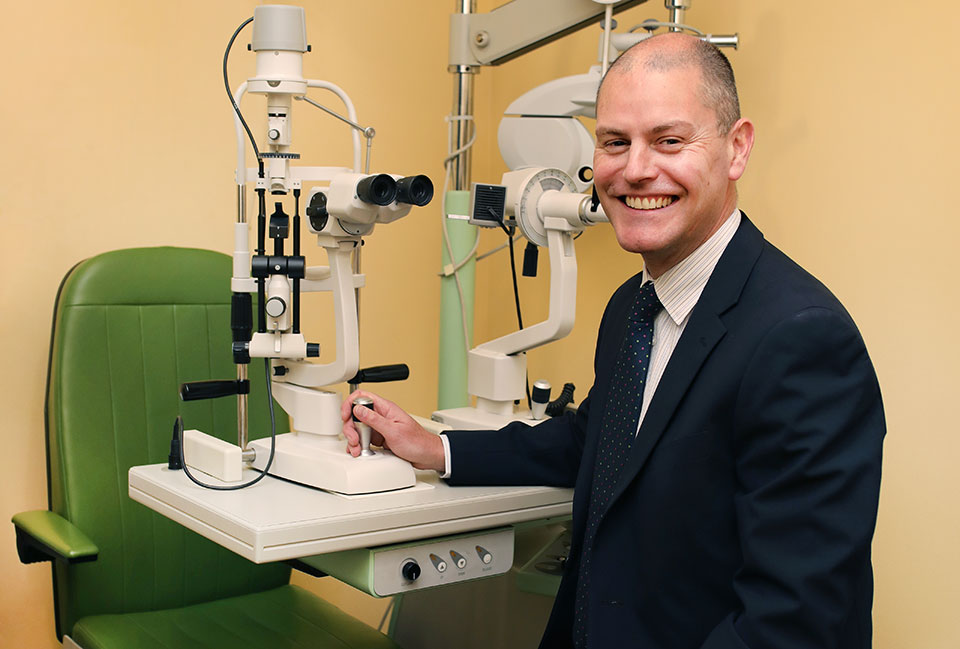- OT
- Professional support
- Health services
- Mastering MECS
Mastering MECS
County Durham practitioners talk with OT about the benefits that Minor Eye Care Services can provide to patients, practitioners and optical practices

27 November 2018
A service that has transformed eye care delivery in County Durham has addressed a quandary familiar to many optometrists.
Previously, when assisting patients who were unable or unwilling to pay for services outside the remit of a General Ophthalmic Services (GOS) sight test, optometrists either performed the service for free or referred patients to often lengthy waits at eye casualty.
After the introduction of a Minor Eye Care Service (MECS) by Durham Dales, Easington and Sedgefield Clinical Commissioning Group (CCG) and Darlington CCG in 2015, patients can now be seen closer to home while optometrists are appropriately reimbursed for their work.
A total of 44 optical practices in the region are now signed up to the service, with around 20% of patients who would otherwise have been seen through hospital ophthalmology departments diverted to MECS following the introduction of a referral management service.
It saves GP appointment slots and means that a greater number of patients are seen by the right clinician first time
A new opportunity
Local Optical Committee Support Unit (LOCSU) commissioning lead Zoe Richmond shared that there has been a high level of support for MECS among optical practices.
“In my experience, community optometrists are quite frustrated that they can’t deliver care beyond GOS and they are very keen to get involved and support their patients,” Ms Richmond observed.
Ms Richmond’s role involves supporting and advising Local Optical Committees (LOCs) and CCGs on service re-design and innovation.
She contributes to the development of new services by sharing lessons that have been learnt across the country.
Ms Richmond, who works part-time as an optometrist in Saltburn by the Sea, said that the MECS service in Durham is one of the most well-established within the UK.
“Service activity has increased year on year,” she shared.

A concerted effort has been made to make patients aware of the service in the area, Ms Richmond highlighted.
“What we do find in some areas is that patients tend to bounce around the system before they find the appropriate level of care. They might go to a pharmacy or a GP practice initially,” she shared.
“It is really important that patients know they can come to an optical practice in the first instance,” Ms Richmond added.
In collaboration with LOCSU, posters providing information on MECS have been developed for display in optical practices and GPs.
Engagement events were held with local pharmacy and GP committees, while reminders about the service were included in GP newsletters.
Ms Richmond emphasised that in County Durham all referrals go through a GP.
“If we engage with GPs, they know that there is an appropriate service available. They can then refer and signpost people with confidence into MECS,” she said.
It has brought people into the practice who wouldn’t have normally walked in the door
Involving GPs
An important step in enhancing the uptake of MECS in the area has been involvement with Care Navigation teams.
Ms Richmond explained that Care Navigation allows GP practices to identify patients who might be suitable for signposting to other commissioned services within primary care.
“Within a GP practice, there are trained care navigators. Their role is to understand what the patient is contacting the practice for and provide the patient with information about services in their community that may be appropriate,” she said.
MECS was chosen as one of six pathways from a long-list of different services.
“It has been rolled out quite recently and has been going really well. It saves GP appointment slots and means that a greater number of patients are seen by the right clinician first time,” Ms Richmond emphasised.
MECS is a group effort in the area. Practices will assist each other if they are unable to offer an appointment within the necessary timeframe.
The network of practices also means that a smaller practice that is only open five days a week can be part of the seven-day service.
When asked why MECS has been successful, Ms Richmond points to three strengths of the service within the area.
“I think it comes down to communication, engagement and collaboration,” she said.
The LOC, Primary Eyecare Company and LOCSU work closely with the service planning and reform teams and are “genuinely invited around the table” to perform service evaluations.
“They really do understand what primary care and community optical practice can deliver,” Ms Richmond shared.
“When the trust is struggling they can come to us and see if this is an area that we can work together on,” she added.
Alongside providing a convenient service for patients and giving practitioners the opportunity to broaden their clinical practice, Ms Richmond observed that MECS results in cost savings for CCGs.
“They are using their specialist centres for what they are intended to be used for – seeing the more urgent and complex cases – while the low risk activity is seen out in primary care at a lower price,” she said.
Director of commissioning for Durham Dales, Easington and Sedgefield CCG, Sarah Burns, said that the service means that patients are often seen quickly without having to wait for a hospital appointment.
“The service is right on the doorstep for patients and is helping us manage demand at our local hospital eye services, ensuring we can treat the most acute conditions there,” she emphasised.
Now we can see them in practice and get paid for the appointment. It saves us having that conversation where we say, ‘We are more than happy to see you, but you are going to have to pay’
MECS in practice
Dr Tony Gibson is the optometrist director for Cooper and Leatherbarrow, a group of independent practices in County Durham and North Yorkshire.
The main practice, located in Darlington, is open six days a week and operates two clinics a day.
Four optometrists are employed by the practice, alongside five support staff, a practice manager and a technician.
The practice introduced MECS in 2015 and sees around 40 patients a month through the service.
Dr Gibson highlighted that working within the service made his job more rewarding.
“From a practitioner point of view, it expands the scope of your practice. It makes your day a little bit more interesting,” he shared.
Dr Gibson added that MECS allowed practitioners to make use of extra clinical qualifications, such as independent prescribing.
Involvement in the service has also broadened the practice’s patient base.
“It has brought people into the practice who wouldn’t have normally walked in the door,” he shared.

Appointed to the local referral management service alongside three other optometrists from the area, Dr Gibson works as a triage practitioner, assessing referrals that have been made to the ophthalmology department within County Durham.
“Our job is to sit usually once or twice a week with a series of referrals and decide whether they are appropriate to go to secondary care or if they can be referred back into the community,” he explained.
Dr Gibson estimated that between 20% to 25% of referrals are dealt with in primary care through the triage process.
Smooth journey
Third generation optometrist and managing director for Cooper and Leatherbarrow, Ellis Leatherbarrow, highlighted that before MECS was introduced, practitioners would have to charge patients who presented with minor eye conditions, such as flashes and floaters, or assist them on a goodwill basis.
“Now we can see them in practice and get paid for the appointment. It saves us having that conversation where we say, ‘We are more than happy to see you, but you are going to have to pay’,” Mr Leatherbarrow observed.
He shared that the independent’s involvement with MECS has been reasonably smooth.
“It hasn’t been particularly onerous and it adds an extra dimension to the practice. For us it has certainly been a very worthwhile activity,” Mr Leatherbarrow emphasised.
It became apparent very quickly that our optometrists really enjoyed the additional fulfilment and variety provided by MECS in addition to routine eye examinations and refraction
Patient benefits
Sean Hayes is an optometrist partner at Specsavers in Bishop Auckland, County Durham.
The practice employs a staff of 58 people, including 12 optometrists.
Mr Hayes explained that he had no hesitation about signing up for MECS.
“From a personal point of view, I am loathe to turn a patient away and either say ‘I can’t look after your eye problem, you have to go to your doctor or to the hospital’ or ‘You have to go to the practice down the road.’
The scheme has been operating at the practice for three and a half years, with staff seeing around 160 patients each month for MECS appointments.
Like Dr Gibson, Mr Hayes is also a triage practitioner within the CCG.
He noted that cases which may be more suitable for primary care, such as blepharitis or dry eye, can be seen by a local MECS practice.
“It saves the CCG money, it takes some pressure off ophthalmology and the patient gets resolution,” Mr Hayes said.

He emphasised that involvement with the scheme has allowed optometrists to challenge themselves clinically.
“It became apparent very quickly that our optometrists really enjoyed the additional fulfilment and variety provided by MECS in addition to routine eye examinations and refraction.”
“If an urgent MECS appointment comes in, even if it is just before closing, there is never an issue with an optometrist turning a patient away,” Mr Hayes shared.
Offering MECS provides advantages in terms of recruiting optometrists, which can prove challenging in the North of England, he said.
“It gives us a real differentiator. We have found that the variety offered by MECS appeals to a lot of optometrists,” Mr Hayes observed.
He highlighted that having the flexibility to see patients within a short timeframe is key when a practice is first introducing MECS.
Mr Hayes also emphasised the importance of providing thorough training to staff who are triaging patients.
This task is performed by clinical support staff, with each decision reviewed by optometrists.
One of the benefits from MECS that Mr Hayes highlighted was increased collaboration between different types of optical practice within the area.
“I think unity is very important,” he said.
“One of the keys to the success of the scheme has been local independent and multiple practices working together to provide an accessible and high-quality service right across the CCG and surrounding areas.”
Image credit: Dave Charnley


Comments (0)
You must be logged in to join the discussion. Log in